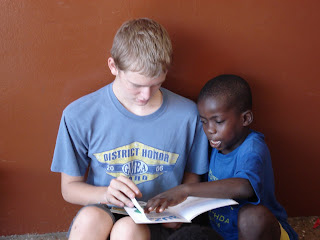
Mary Kay writes…
Our children are growing up in a very different world than we parents did. The changes in travel, immigration patterns, communications, and the like have created a global environment. But how do we raise our children to succeed in this environment and to be aware of the differences around them? How do we teach them to understand and value that future co-worker who comes from halfway around the world?
Charlie and I both grew up in fairly homogeneous environments. Everyone was pretty similar to us – same language, same culture, same general values. Being different in my elementary school meant that you either had just moved into the neighborhood from somewhere else or you were one of the Jewish children (there were three in my grade). But by the time we were leaving our jobs to come on the mission field, we were working in a completely different environment. Charlie worked in one group at Lucent that had group members from the US, Nigeria, China, the Ukraine, and India. Throughout my consulting career, I worked with Indians, West and East Africans, a Jordanian, Eastern Europeans, Russians, Taiwanese, Koreans, and more, as co-workers, as subordinates, and as clients. Boy, had the world shrunk since my elementary school days!
I recently received a missions e-mail on raising global kids, which really got me thinking about this issue. What had we done, prior to moving overseas, to help prepare Chip and Ken for life in a global society? What were we doing now, and how was it different?
We always tried to raise our children’s awareness of global issues as they were growing up. Our first strategy was to send the boys to our local elementary school, Chesnut Charter School, where at the time we attended there were students from 26 different countries, speaking 13 languages in the home. We introduced them (OK, not so successfully for those of you who know how picky an eater Chip is) to foods from around the world. We had a globe and an atlas and we would look up places that we heard about on the news. Eventually, we hung a world map in our hallway and placed a dot in each place that we had friends living, so that we could see it and remember to pray for them. It was amazing how widespread our network was, even before we entered the mission world!
We also traveled, trying to show the boys other parts of the world. This started the process that landed us in Ghana – we came to visit friends who had moved here. Ostensibly we just wanted to show the boys another part of the world, a place very different from suburban Atlanta, but God had a different plan. We had no idea when we visited in 2002 that we would all fall in love with Ghana and her people, much less end up living here!
We moved our children overseas to Ghana 2 years ago when they were 15 and 12. It has been amazing to watch their transformation. We had always lived in a fairly multi-cultural environment. However, in looking back on it now, that was still an environment where all these children from all over the world were trying to become American (except on International Festival Day). The difference in being in a (no more diverse) international school is that everyone brings their own culture to the table. If I were looking at schools back in Atlanta now, I would definitely explore sending the children to an international (expatriate) school there, as a way of growing global kids.
The other thing that has really impacted us is listening to, watching, and reading non-US news media sources. With the internet and cable now, you can listen to or watch BBC, Al Jazeera, and other similar networks. It is very interesting to compare and contrast their reporting. Our local Ghana news TV station shows 30 mins each of CNN, BBC, and Al Jazeera each morning. It is eye-opening to watch the same news stories covered from three different angles. With older children such as ours, this has given us a real opportunity to discuss media bias and discernment when watching any single source. Other programs, like the BBC Africa radio call-in show “Africa Have Your Say” have been the basis for many interesting dinner table discussions on topics we would never have discussed in the US, such as the merits (?) of polygamy and the torture of female circumcision (try discussing that with teenage boys!). As with anything, we work to bring a Biblical perspective to these topics, but I daresay they would never have even surfaced in the US.
As we visited colleges this summer, one of the experiences most often promoted is the college semester abroad. These are great experiences for any of our young people, opening their eyes to new worlds! I really applaud those students who choose to go to the hard places like Africa and India, rather than just hanging out and having fun in Europe. But Chip had an interesting comment on this: “If my family lives in Africa and I am going to school in the US, are all my semesters considered semesters abroad?”
I have become all things to all men so that by all possible means I might save some. 1 Cor 9:22 (NIV)




